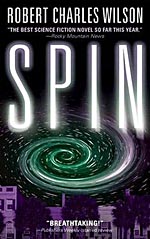
![]() BigEnk
BigEnk
11/15/2024
![]()
A better version of the writing style that I found with Alistair Reynolds in The Prefect and a much better version what I think Neal Stephenson was trying to do with Seveneves. As much of a love story as it is a story of mysterious first contact, Spin follows a pair of fraternal twins and their mutual childhood friend through the tumultuous times that follow a permeable membrane encapsulating the Earth, while outside in space, time accelerates to breakneck speeds. These aren't ordinary children though: the twins are the progeny of an industrious and domineering capitalist whose technology is benefited by the 'spin', and who coldly builds his son into the heir of his advantageous position. The story itself though is told as a pseudo-memoir of Tyler, the best friend to both Jason, the heir-apparent, and his sister Diane, who Tyler has been in love with since he can remember.
Spin has three main focal points. The first and perhaps least explored is the effects that the 'spin' has on society, culture, religion, and government. We see first hand the waves of emotions that humanity goes through as they come to accept the new normal. We see the science denial, the apathy, the anxious brooding thoughts of despair under the skin of a moldering social code. We see what happens when people are faced with their own impending mortality. We see how all of this effects the structure that we all live under. Now, is this examination the sole focus of the book, no. But it damn sure is more realistic than a book like Seveneves, and still allows for optimism and hope at the end of it all without turning a blind eye to the hard facts psychology in the face of an upending status quo. Wilson does a good job of manufacturing speculation on what might transpire here. The world behind the story does not fade into the background, it's right there on the surface.
Second is the exploration of the hard-ish science that revolves around humanities attempts to understand the spin, and potentially prevent what they see as a potential extension level event as the sun begins to grow through the billions of years of time outside the membrane. The execution of the main concept was brilliant to me. I loved the idea of seeding Mars with life and in just a short time seeing the results. I loved the bio engineered node system (a von neumann machine) and how that ties in with the ending and the 'hypotheticals'. I especially loved the idea of another phase of human life brought about by injecting DNA editing technology, how that could be a platform for more acute changes in psychology physical ability, and what that would do to our conception of what it means to be human. The ending takes these concepts to a broader, galaxy/universe level stage. I enjoy a book that drip feeds me details on that level, and finishes with a flourish of new ideas that leaves you dreaming about the future like Spin does.
Finally, where I think the meat of the book lies, is in the characters. I applaud Wilson's choice to stick with the same three characters throughout the story. Doing so allows him to slowly build them out through their actions and choices. It allows him the luxury of drawing on characterization that he wrote hundreds of pages to ago to show growth and progression through time. These characters are heartbreaking and resilient all unto themselves. The love between Diane and Tyler is palpable, but doesn't feel trite or distracting, it simply is. There are a few standout side characters, headlined by the twins' mother, Caroline, an alcoholic who is sporadically involved in her children lives but is every bit a textured person, who we see but a window into. I thought it was a cute bit of characterization that the Tyler is drawn as a sometimes detached and empty person to justify how the prose is written. It makes sense considering that he's brought up in the 'spin generation' which is brought up a lot, and because of his background as a medical doctor. Tyler, more than anyone else, is able to separate himself from the tumultuous world he lives in, which juxtaposes him with Diane, who seeks meaning an enlightenment, and Jason, who values knowledge above all else. As the twins lose themselves in the pursue fulfillment, Tyler remains the steadfast friend who watches from the sidelines and picks them up when they fall.
The prose itself isn't something to write home about I suppose. It's not creative, especially beautiful, or stylistic, but it serves its purpose well; an economic vehicle with which Wilson can express his plot and characters. It is, however, especially readable prose that can appeal to a lot of people, a similarity that I draw to Reynolds. What I find especially impressive about Spin is Wilson's ability to marry a lot of harder-science material with deeper characterization that I've found in most genre literature. He also doesn't get bogged down in technical jargon when he explains things, and spaces section of exposition and world-building with character focused drama.
It does dip in intensity and interest towards the middle. My interest in the plot sagged as it sagged without a clear direction forward. This was salved by an ending that was not only a rejuvenation and a satisfying completion to many narrative threads, but also done with a grace that I wasn't expecting. Apparently this is also the first in the a series of books, but it hardly needs it, which should be a ringing endorsement by itself.